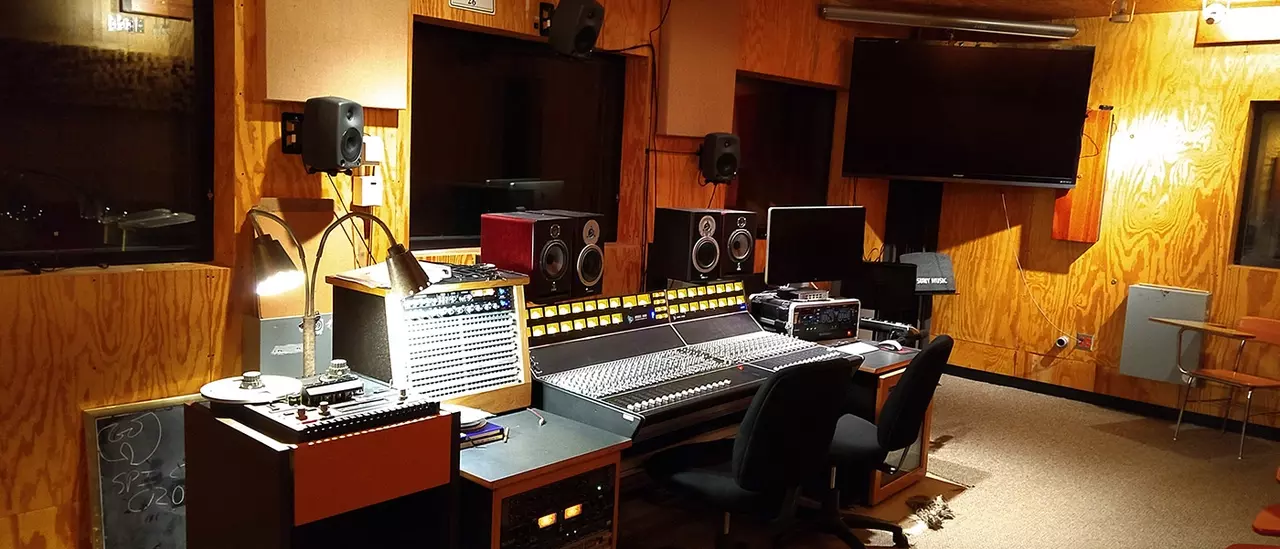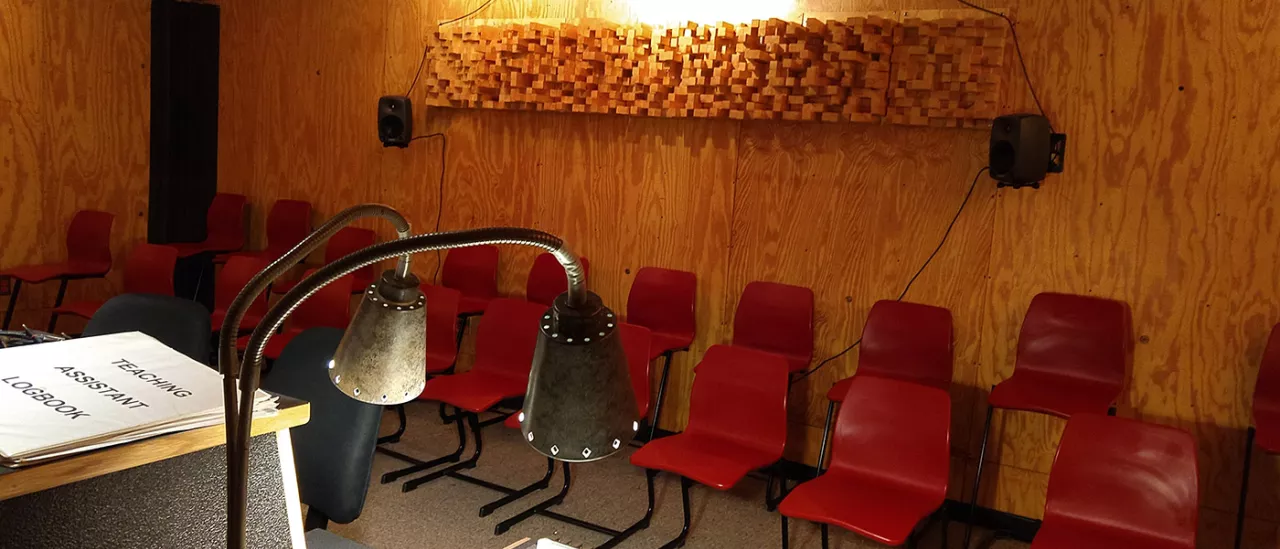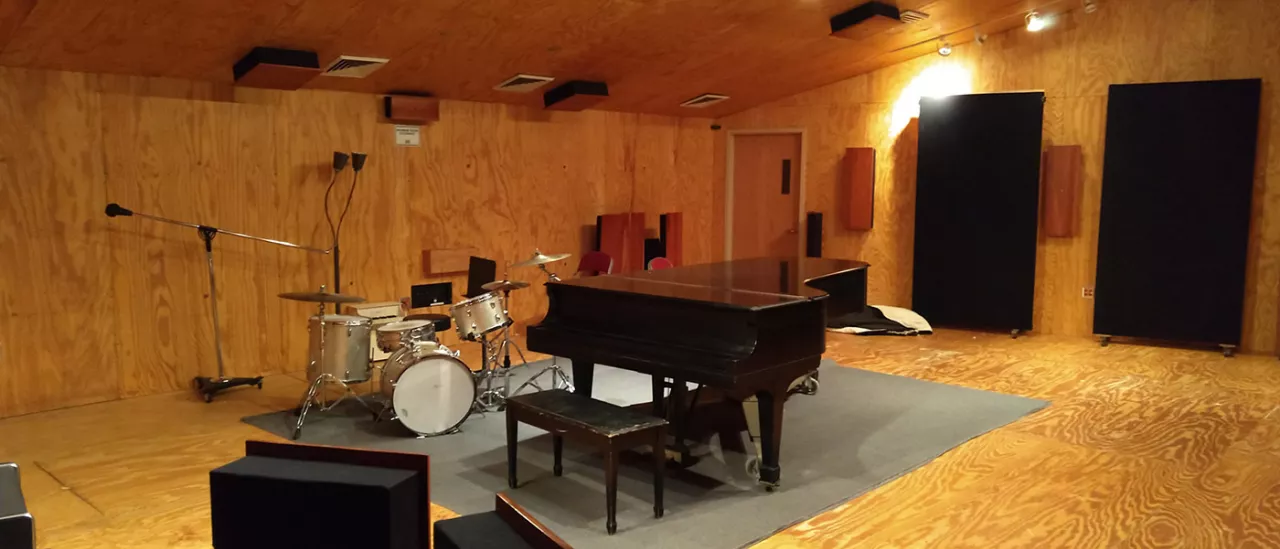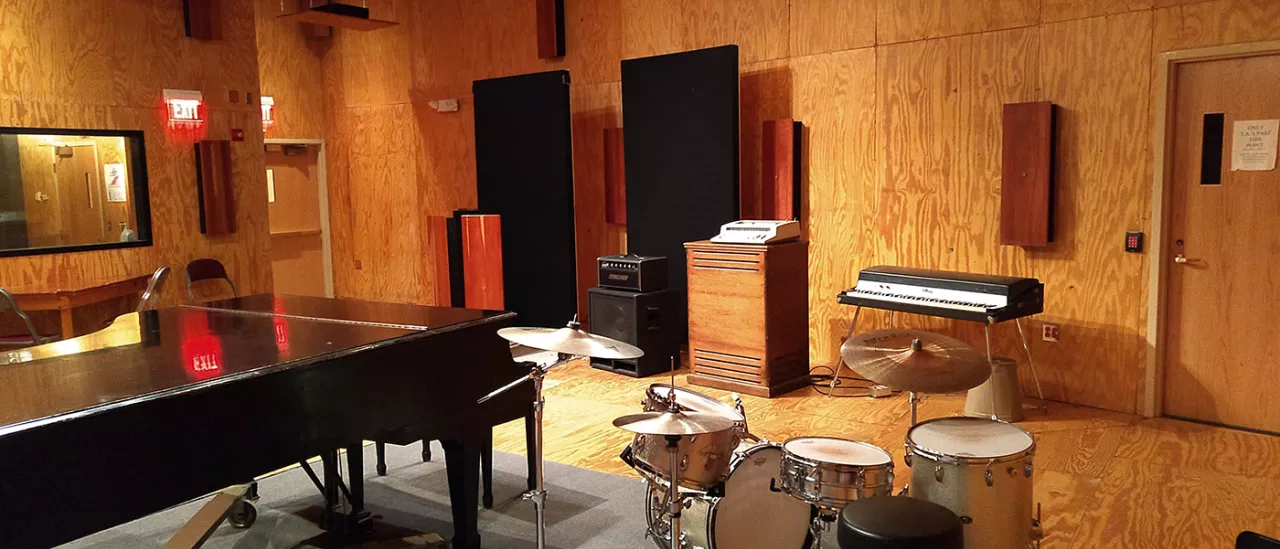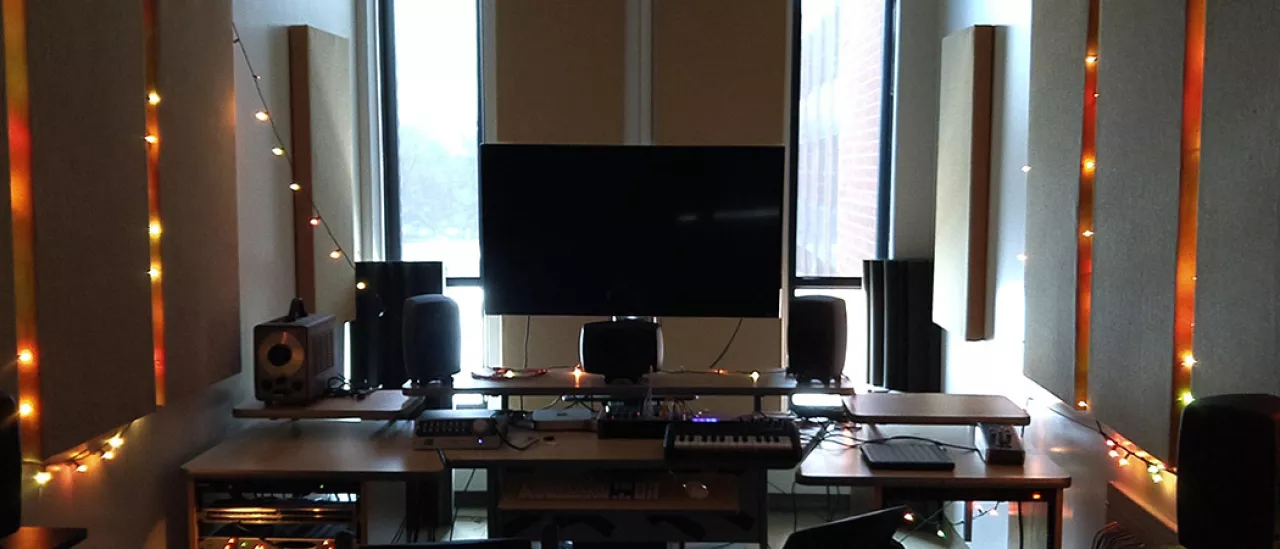Schedules
Policies
CREDIT REQUIREMENTS
Studio Assistant 1 MUSC 3127
ROOKIE TEACHING ASSISTANTS: 2 Credits
All Rookie TAs are required to fulfill one semester of class-time TA duties and a work assignment. Your work assignment will consist of assisting one of the audio arts instructors or working for the department to assist in check in/out procedure for the rehearsal rooms and piano labs.
- For each credit hour you are registered for; you must spend as much as 3 hours of equivalent class time in a classroom setting (150 minutes per week) assisting AAP instructors. (NOTE: If your instructor excuses you from having to be in class your commitment is still fulfilled.) OR
- Oversee the rehearsal rooms access and gear inventory for 3 hours a week.
- Be present and helpful with any tasks that the instructor gives you. In your defense, an instructor should never expect you to complete a task that is above your ability (presuming that your abilities include all the required skills obtained in MUSC-192 and MUSC-292 classes).
- Rookies assigned to rehearsal rooms are required to complete the same number of hours (1 credit = 3 hours of work). Procedures for rehearsal rooms will be discussed with every TA.
- Concert Recording: Each rookie TA is required to assist an advanced TA with a concert recording. It is your responsibility to learn how concerts are recorded and help the advanced TA with setup and teardown of equipment. In some cases there will be opportunities to help with live sound reinforcement.
Studio Assistant II MUSC 4127
ADVANCED TEACHING ASSISTANTS: 1-4 Credits
All Advanced Audio Arts Production Minors are required to attend a 1hr class Monday evenings. TA’s need to fulfill a remaining 4 credit hours of Teaching Assistant duties (for a total of 6 credit hours including hours earned as a Rookie). This includes the following:
- Mondays meeting counts towards 1hr of your credit hour duties, two hours of studio time must be booked in addition to the class.
- For each extra TA credit hour registered, the TA must have 3 hours per week booked in the studio TA schedule.
- Studio Hours: Each TA is required to be present in the designated location of the music building to give support to students working on projects in studios A, B, C, and D. TAs assigned to studio A, B, and D should be present in the studio A area (either the control room or entrance hallway). TAs assigned to studio C should be present, or in the location of, M115 on the first floor near the rehearsal rooms.
- Concert Recording: Each TA is required to complete at least one live concert recording per semester. For each concert on the schedule, two TAs should be present, you and a rookie TA to assist. In the interest of experience and resume building, it is in the student’s best interest to participate as much as possible in these concert events. Once everyone has fulfilled their required concert duty there may be more opportunities to record additional concerts. In some cases there will be opportunities to perform and/or help with live sound reinforcement.
Both Rookie and Advanced Ta’s will be tested on an individual basis twice in the semester. The tests will involve normal recording operations in all the studios and mobile recording rigs. The specific items of the tests will be provided and reviewed in class. The tests will be graded P/F.
ATTENDANCE POLICY
Attendance is absolutely required by all TAs, with NO EXCEPTIONS!!! We operate on a 2 Strikes – you’re out policy. The fist absence will be discussed with Dr. Legname, Mr. Balins, Mr. Masteller, Mr. Vitale and excused if appropriate. If a second absence occurs, you will automatically FAIL the semester. You will, however, not be relieved of your TA duties. Based upon your performance for the remainder of the semester, you may or may not be allowed to repeat the TA class the following semester.
STUDIOS & REHEARSAL ROOMS
Access to all studios is limited to students currently enrolled in Audio Arts Production classes, unless special arrangements have been made prior to their use with an appropriate faculty member. Access is also limited to hours when a TA is on duty. Students may not be in any studio without a TA on duty unless special arrangements have been made with appropriate faculty.
- Studio A – This facility is provided for students currently enrolled in Audio Production 3 and 4 only. This studio may not be used by students enrolled in Audio Production 1 or 2.
- Studio B – This facility is provided for students currently enrolled in Audio Production 1. Studio B may also be used by students enrolled in: Audio Production 3 and 4.
- Studio C – This facility is provided for students currently enrolled in Audio Production 1. Studio B may also be used by students enrolled in: Principles of Recording, Audio Production 3 and 4.
- Studio D - This facility is provided for students currently enrolled in Audio Production 4 only.
- Rehearsal Rooms – The rehearsal spaces in the new wing are made available to music students. Students must reserve a time slot in order to use the room. If their name is not on the calendar then they are not allowed to use the room. There are no walk-ins allowed. A rookie TA on duty will perform check in/ out duties for each room.
EQUIPMENT
It is every TA’s duty to be responsible for maintaining the inventory and condition of the equipment no matter if they are on or off duty. We all need to have the equipment available to us, so follow the Golden Rule! (Do onto others as you would have them do onto you.) Any misuse of studios or associated equipment should be reported immediately. Here are some guidelines for common equipment issues:
- Studio/Equipment misuse : Misuse should be reported immediately via email to Audio Arts faculty, Andris Balins (andris.balins@oneonta.edu) and Gavin Vitale (gavin.vitale@oneonta.edu.) Your report should include details about the individuals involved, the equipment involved, and the time/ location of the occurrence.
- Inventory : A complete inventory check should be done every day by the first and last TA(s) on duty (i.e. openers and closers). This includes not only a check of the inventory checklist on sheets provided, but also the physical inventory in the studios and mic closet.
- Damaged Equipment : Any damaged equipment should NOT be returned to regular inventory. After being checked back in, damaged equipment should be placed in the damaged equipment box located in the mic closet in Studio A or Studio C, and the TA must send an email to the Audio Arts faculty that includes details about which piece of equipment has been damaged, what the specific problems are, how they occurred, and (if appropriate) recommendations on their repair.
DUTIES
- Punctuality: TAs must always be on time. Circumstances do arise when you may have no choice but to miss your studio time. This is excusable under the condition that you find another TA who has agreed to cover your hours for you PRIOR to your conflict.
- Attitude: Remember when you were new to the studios and were looking for a person to be helpful and friendly? Well, now you are that person with the experience and knowledge to help, so be friendly and helpful! It will certainly help pass the hours faster if you check up on the studios and the people using them. The students you support look up to you, so set a good example!
- Support: You are there to give technical support to the students with less experience. It will also expand your abilities to help other students troubleshoot their problems. This does not mean that you should do their work or repeatedly fix their problems for them. You are there to help resolve issues and explain to them what is going wrong and why. The more you teach them the less they will rely on you because next time they will be able to reason through the problem on their own. (They will then go on to make great TAs who will do the same…)
- Equipment: The TA(s) on duty must check in/out all equipment that gets used by students. For procedures on how to do this please see the heading “PROCEDURES”.
- Access: The TA on duty is requited to give access to students working on projects in studios A, B, and C only. Priority is given students involved in audio arts groups working on projects. Students may also sign up for extra time to work on group project or personal projects. If in doubt about a student please consult the online calendar.
PROCEDURES
Openers:
- Open doors to the studios and power up the equipment. Remember that monitors are the last to be turned on. Verify that all equipment in the racks is on.
- Check inventory to make sure that all equipment was checked from the previous night.
- Verify that inventory is physically present. Write your name and date at the top of the page.
- Check out equipment as needed for students working on projects.
- Check up on studios to make sure things are going smoothly and equipment is being used properly.
- Deal with damaged equipment if necessary. (See “EQUIPMENT – Damaged Equipment” for details)
- At the end of your shift, connect with the TA taking over for you and fill them in on what is happening in which studios.
Mid-day shifts:
- Check in with the TA that you are taking over for to find out roughly what is going on in the studios.
- Check the logbook to see what equipment has been checked out.
- Do a walk-around to verify that equipment is being used properly and to see what is happening in the studios.
- Once the walk-around is complete, go back to give assistance to any students having difficulty.
- Check in/out equipment as needed.
- Deal with damaged equipment if necessary. (See “EQUIPMENT – Damaged Equipment for details)
Closers:
- Follow all mid-day shift procedures
- Before leaving, make sure that all equipment has been checked back in. You should verify the return of all checked out equipment and then check off the master inventory list.
- Turn off the studio monitors, then power down the computers, and finally turn off the power strips in the racks.
- Turn off lights and verify that all doors are locked. Studio A TA should check Studio B as well. It is very important to remember to lock the mic closet in Studio A (since it does not lock automatically).
Equipment Check-Out:
- Unlock the mic closet.
- Identify the equipment to be checked out and mark the gear and ID number in the logbook (not all gear has an ID number).
- Write the date, time, and name of one individual who will be responsible for the gear.
Equipment Check-In:
- Make sure that all cables are wrapped properly upon return. If they are not, tell the student that you will not accept an improperly wrapped cable.
- Verify matching ID numbers for appropriate gear, and mark that the gear was returned in the logbook.
Concert Recording:
Request for concert recording will be announced throughout the semester. Two TAs must be present to work the concert. The advanced TA is the lead engineer. The rookie TA is the assistant engineer. It is the responsibility of both TAs to do the following:
- Collect all the needed gear for the recording. If the concert occurs in M201 you will use the equipment in the loft. If the concert is in another location you must use the mobile gear. Get in touch with Mr. Vitale at least 1 day before the concert to arrange a pickup time (unless the concert occurs Saturday or Sunday, in which case you must secure the equipment before the weekend). Procedures for using all equipment will be discussed in the TA class.
- You must arrive at the concert site AT LEAST 1 HOUR PRIOR TO PERFORMANCE. Though, earlier is better. This allows you to setup the gear and do a sound level check if there are last minute rehearsals being done. Introduce yourself to the music director at an appropriate time (not while they are rehearsing). It puts people more at ease when they know you are there and you’re ready to go.
- When the recording is completed back the concert up to a portable drive. Both students must meet within 3 days to edit, mix and bounce the concert recording. You may do this on any studio or lab computer. Or, you could also edit/mix the recording right after the concert. Procedures for submitting the audio files will also be covered in class.
Access: (keys and cards)
- All advanced TAs will be given card access to the studios at the beginning of the semester. Additionally, there are keys for the Studio A mic closet that can be obtained by asking Kay Gale in the music office.
- All rookie TAs will be given card access to the rehearsal rooms.
- All advanced TAs will also be given card access to the loft in M201 to perform concert recording duties.
- AT NO TIME ARE YOU TO ABUSE YOUR CARD ACCESS PRIVILEGES. If we find that you are abusing your privileges then it will be dealt with by the audio arts faculty member. This may include having restricted access and/or a decision may be made to revoke all your privileges.
A FEW DO-NOT'S:
- DO NOT book yourself for sessions or rehearsals in any of the studios while you have TA duties. If you are preoccupied with a session you are not focused on helping the students who need you. This is a conflict of interest.
- DO NOT hang out in the computer lab on the first floor. You are there to be easily approached and accessible to the students. Being downstairs does not put you in a good position to do this. If you need to use the restroom just leave a note hanging on the door that you will return shortly.
- DO NOT allow students to take food or beverages into the studios or rehearsal rooms. It is ok to bring locking-lid beverages into the rehearsal rooms (e.g. a water bottle).
- DO NOT do anything that might be viewed as a conflict of interest or an abuse of TA privileges. You are the responsible SENIOR ENGINEER on duty, and you must therefore act the part, or in other words BE PROFESSIONAL.
Procedures for Reserving Rehearsal Rooms M101, M114, and M117
Students currently enrolled in an ensemble or in private lessons are eligible to reserve rooms M101, M114, and M117 for designated durations on a first come first serve basis.
- You may request room reservations in the Music Department Office, Fine Arts 115, Monday through Friday between the hours of 9:00 AM and 5:00 PM.
- On the day of your reservation, you must sign in with the Studio TA on duty in Fine Arts M115.
- Please bring your school issued ID. The Studio TA will need to verify your identity. Rooms cannot be used unless they have been reserved. THERE ARE NO WALK-INS ALLOWED UNDER ANY CIRCUMSTANCES.
- Once your identity is verified, the Studio TA will escort you to the reserved room and take inventory of the equipment. You and the TA must write your name, sign, and date the form to verify the presence of the equipment.
- At the end of the session, you must check out with the studio TA. Failure to do so may result in revoking future access to the rehearsal rooms. When you checkout the Studio TA will take a second inventory, and note any damages, missing items, or other discrepancies. You will again sign and date the form.
- Each eligible student may sign up for a two-hour time block per week, and may reserve this up to one week in advance, but not earlier. Students in need of an acoustic drum set to practice on may reserve no more than 3 one-hour slots per week.
- None of the equipment may leave the rooms at any time. If an item is damaged or not functional please inform the Studio TA right away. No student is allowed to use the practice room for storage. Anything brought into the rehearsal rooms must be taken out. There is no food allowed and beverages must have a locking top (e.g. a portable water bottle).
Equipment
Studio A Equipment
API 1608 32 Channel Analog Console
Avid Pro Tools HDX System
Avid HD I/O 16 x 16 Interface
ART PRO MPA II (2 Channels)
Avid PRE (8 Channels)
Presonus Eureka x 2 (2 Channels)
Millenia HV-3D (4 Channels)
AKG C100
AKG D112
Beyerdynamic M160
Blue mouse
Electro Voice RE20
Electro voice 457B
Oktava mk-012
Rode NT1A
Sennheiser e906
Sennheiser md421
Shure sm57
Shure sm58s
Shure sm81
Apple MacPro 8-Core, two 2.26GHz
Apple LED Display 24” x 2
Focal - Solo 6Be - 2-Way Near-Field Monitors
Genelec 8030.LSE Power Pack 5.1 Speaker System
Studio B Equipment
Mackie 1642 VLZ 16 Channel Mixer
Focusrite Clarett 8pre
Tascam TSR-8 - 8 channel audio tape recorder
Yamaha DX 27
ART MPA II (2 Channels)
Apple iMac Computer2.5 GHz Intel Core i5, 4GB RAM
Dynaudio Acoustic BM5Apair - studio monitors
Apex Expressor Compressor (x2)
Alesis Nano Verb
Lexicon LXP-1 Effects Processor
Studio C Equipment
Digidesign C24 DAW mixing console
Focusrite Clarett 8pre
API A2D w/ Digital Out (2 Channel)
- Audio Technica Pro37
- Audix D6
- Beyerdynamic M88
- Beyerdynamic M130
- Beyerdynamic M160
- Earthworks SR69
- Electro Voice 635a
- Oktava MK-012 pair
- Sennheiser e609
- Shure KSM32
- Shure KSM44
- Shure sm57
- Studio Projects C4
M-Audio Oxygen 8 25-key MIDI controller
Apple iMac Computer2.5 GHz Intel Core i5, 4GB RAM
Dynaudio Acoustic BM5A pair - studio monitors
